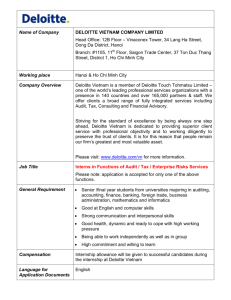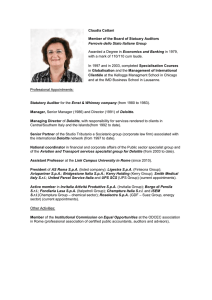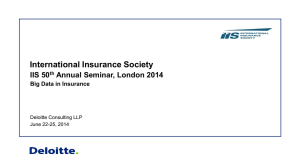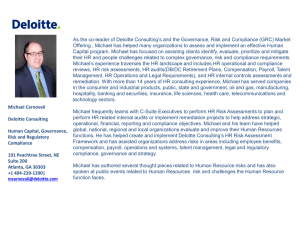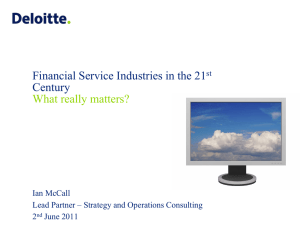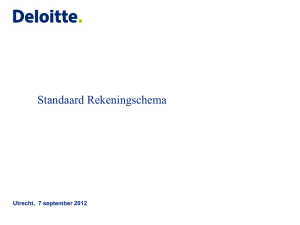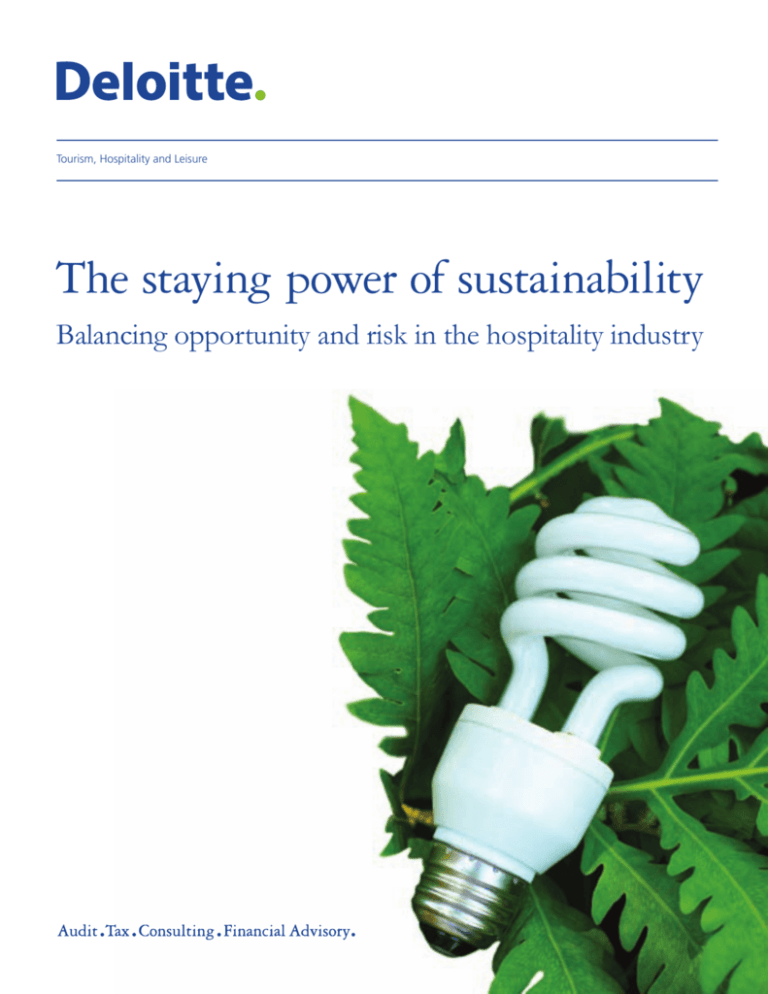
Tourism, Hospitality and Leisure
The staying power of sustainability
Balancing opportunity and risk in the hospitality industry
As used in this document, “Deloitte” means Deloitte & Touche LLP and its subsidiaries. Please review www.deloitte.com/us/about for a detailed description of the legal structure of Deloitte LLP and its subsidiaries.
The staying power of sustainability
Balancing opportunity and risk in the hospitality industry
Sustainability is a critical business issue that is becoming a mandatory requirement for the
hospitality industry. Unlike certain other issues, sustainability is being shaped by drivers outside
the industry’s control. Additionally, it’s not just about going green, it is about competing in
a different world. While tensions can exist between pursuing sustainability and achieving
profitable growth, there is evidence that suggests that expenses can be lowered and demand can
be increased from the pursuit of an eco-friendly strategy.
The sustainability movement has been building in recent years due
to sharply rising energy costs and increasing pressures from major
stakeholders. The following factors are contributing to the greening
of the hospitality industry.
fixtures that limit water flow, for example. While going green is smart
business, it requires frequent monitoring, both in terms of what
consumers are thinking and in how buildings are performing relative
to the latest standards.
Carpe Diem is becoming the guiding principle. Sustainability
maturity and adoption levels within the lodging industry are
still evolving, both for existing buildings and new construction.
Considering that there are far more “unsustainable” buildings in the
US than there are green buildings, there is first-mover advantage to
adopting green practices. Companies have a very real opportunity
to seize a leadership position in sustainability that may enhance the
brand’s overall image and attractiveness to consumers.
Sustainability efforts can provide tax efficiencies. Various
governments are offering tax incentives for companies that take
energy-saving initiatives. Tax and grant benefits are also available
for some businesses that participate in recycling programs or use
alternative energy sources. Eventually, companies could even find
themselves subject to additional excise taxes, levies, or regulations if
there is a failure to adopt green programs.
Sustainability is not a fad. Sustainability is a critical business issue
that is quickly taking a sharper focus. Unlike other business issues,
sustainability is being shaped by drivers outside of the industry’s
control. The UN’s World Tourism Organization has reported that the
growing global tourism industry could increase emissions by as much
as 150% over the next 30 years. Thus, multiple constituencies –
shareholders, regulators, travelers, corporate travel departments – are
demanding that lodging establishments address the issue now.
Green is an ongoing process, not a goal unto itself. Today’s
hospitality leaders promoting sustainability understand the compelling
financial, regulatory, risk mitigation, and broader marketplace
opportunities inherent in evolving their businesses. They are not going
green for green’s sake alone. There are significant financial benefits
to changing over to light bulbs that use less energy or bathroom
Ad-hoc reactions will not do the trick. Leading hospitality
companies address the sustainability opportunity through a disciplined
and structured approach. Ideally, an enterprise-wide perspective
provides the greatest return – from incorporating green construction
solutions to generating savings and operational efficiencies at
existing facilities through eco-friendly renovations and simple in-room
changes.
Resource restrictions are increasing; costs are rising. Longer
term, the issues around the availability and costs of energy and
construction materials are expected to become important factors
supporting companies’ adoption of green technologies, processes,
and operating procedures. Further the ongoing improvements in
sustainable materials are helping companies lower costs and are
leading to faster implementation of green practices.
As used in this document, “Deloitte” means Deloitte & Touche LLP and its subsidiaries. Please review www.deloitte.com/us/about for a detailed description of the legal structure of Deloitte LLP and its subsidiaries.
Corporate social responsibility is also important to tourists
from abroad. Many of these tourists reportedly have even stronger
convictions on the subject than some US travelers. In 2007, the
number of international tourists visiting the US was below pre-9/11
numbers. Further, the US dropped to seventh place in the 2008
Global Travel & Tourism Competitiveness Report, due in part to its lack
of improvement in environmental protection efforts relative to other
countries.
Consumers want green. Beyond any cost, governmental or
regulatory considerations, consumers increasingly are demanding
green behavior from companies. The eco-conscious consumer
segment has grown so large that there are now several acronyms
for them, including Scuppies – socially conscious upwardly mobile
persons – and LOHAS – Lifestyles of Heath and Sustainability. The
latter group was discussed in Deloitte’s Industry Trends 2008 report.
Deloitte survey: business travelers
expect hotels to be green
To provide information to companies to better understand consumers’
green concerns while staying at lodging facilities, Deloitte conducted
a survey of more than 1,000 business travelers in April 2008. A key
finding from this survey was the high bar set by these consumers
who expect environmentally friendly measures from the industry.
Fully 95% of respondents think that lodging companies should be
undertaking green initiatives. Out of the 10 initiatives listed in one
question, respondents checked off an average of 4.8 green building
and operational practices such as recycling and using energyefficient lighting that they felt companies should be taking today.
This sentiment was similarly high across the various gender, age
and income groups, and among frequent and infrequent travelers.
Clearly, then, the industry should be considering the consumer’s green
expectations when planning their sustainability initiatives.
Additional survey findings are discussed later in this report.
“What are the most important green initiatives that you expect
lodging facilities to be taking today?” Top seven responses
77%
Use energy-efficient
lighting
59%
Have cards in room, to request
sheets/towels not be changed
49%
Have water-saving devices
in rooms
46%
Use green landscaping/
groundskeeping practices
45%
0%
Source: Deloitte Consumer Survey, April 2008
20%
40%
60%
•Heightened media attention is drawing attention to the subject.
A Google search through just March and April 2008 found nearly
1,000 news articles with “go (or going) green” in the title. The
increased amount of press activity, however, is creating “green
fatigue” among some consumers that hospitality companies need
to consider.
•Increased levels of awareness and concern mean that green
activities from both corporate travel departments and individual
tourists are ramping up. Nearly nine out of ten business travelers
look to be green while away, according to our survey findings. A
growing segment of companies are catering to these consumers’
demands. Businesses that are laggards in this regard risk losing
market share to others.
•Access to new markets, financial resources and even
investment opportunities increasingly are being granted only
after consideration of a company’s environmental and social
performance. The California Public Employees’ Retirement System
(CalPERS), for example, approved new guidelines in 2008 around
a company’s green behavior that will be used in their investment
decision-making process.
•Government agencies, both here and abroad, are requiring green
action, either at the macro level by requiring the adoption of the
provisions of the Kyoto Protocol, or by various local efforts such
as the City of Los Angeles’ 2008 ordinance that requires new
and renovated large commercial and residential projects meet the
Leadership in Energy and Environment Design (LEED) standard.
52%
Use environmentally safe
cleaning products
•Importantly, global warming is no longer a scientific supposition.
While some outliers may continue to argue, there is general
acknowledgement of the facts and concerns about global warming.
Human activity is impacting climate change.
•Self-monitoring is increasing, partly in response to tightening
regulatory scrutiny, but also because companies are realizing that,
despite short-term costs, there can be longer-term savings.
74%
Use energy-efficient
windows
Conscientious consumers, increased government pressures,
competitors’ actions, rising costs, and the need to improve operational
efficiencies are contributing to the business imperative to go green.
There are numerous considerations driving the movement toward
sustainability.
•Increased regulatory scrutiny, with the potential introduction of US
government regulations around water usage, carbon emissions,
construction codes, and financial performance reporting, are
serving as powerful motivators for companies to embrace green
and improve their risk management practices.
Most Business Travelers Expect Hotels to be
Taking Green Initiatives
Recycle
The sustainability movement in
hospitality: how did we get here?
80%
100%
•Soaring worldwide energy costs are providing motivation to hotel
companies and developers to reduce energy costs in both new
construction and existing buildings. Despite 2008’s softening
economy, data suggest that companies are not cutting back on
their purchases of green products. New York City’s first green
hotel, Greenhouse 26, scheduled to open in 2009, expects energy
savings of around 30% from using a geothermal system that will
heat and cool the hotel.
•Consumer expectations are becoming even more important in
the current environment where information transparency via
the Internet provides immediate access to corporate behavior.
Consumers and other stakeholders are quickly taking notice
through numerous Internet-based venues. A company’s brand
image – a critical aspect of doing business for the industry – can be
directly influenced by its perceived level of social and environmental
responsibility. As several recent examples have shown, a company’s
reputation is one of its more important assets and one of the
hardest to build back up, once damaged.
Defining green: not a black and
white issue
Travelers are becoming increasingly concerned about the
environment and are more often making their own determination
as to what constitutes “greenness” in the lodging industry. There
is much discussion within the industry, among non-governmental
organizations, and even among global scientists and government
regulators as to what encompasses responsible environmental
behavior or whether green initiatives are even necessary.
On the construction side, various organizations, including the US
Green Building Council’s LEED certification program, are helping
the development and implementation of green building practices.
A 2008 study by the CoStar Group found that LEED buildings
command higher rents, have higher occupancy rates and sell for more
per square foot than do non-LEED buildings.
�
�
�
�
�
�
�
�
�
�
�
�
�
�
�
�
�
�
Energy
Water
Electricity
Emissions
Waste Reduction
Indoor air quality
Use of organic/natural
fabrics/foods
Packaging
Recycling/reuse
Transportation
Landscaping
Construction/Removal
Carbon footprint
Preventative Maintenance
Product safety/toxicity
Food: Organic/Local
Energy Star
LEED
Social Programs
�
�
�
�
�
�
�
�
�
�
�
�
Fair Trade
Local Econ. Development
Working Conditions
Health/Nutrition
Educating public
Diversity
Human Rights
Fair Competition
Anti-corruption/Bribery
Safety
Social Philanthropy
Outreach Marketing
For consumers, numerous groups are providing information on green
establishments and other related information. Companies such as
Sabre, Orbitz, Travelocity, Travelport and Expedia make available green
hotel information; some also provide carbon emissions data or sell
“carbon offsets” to passengers. Travelers purchase these offsets to
reduce the carbon footprint of their trips. The carbon offset funds
are then applied toward projects that reduce or prevent greenhouse
gases. Websites such as environmentallyfriendlyhotels.com,
greenhotels.com, and sustainabletravelinternational.org also have
databases and other options available to green travelers.
Consumers indeed are looking for this type of information. Among
the business travelers in Deloitte’s recent survey, nearly two out of
five, 38%, had taken steps to determine whether a hotel was green.
As shown in the chart, they most often were seeking information
online, but some were also relying on friends and travel agents to
help them in their search.
38% Have Taken Various Initiatives to
Identify Green Lodging Facilities
“Which of the following have you ever done to identify an
environmentally friendly lodging facility? (check all that apply)”
Read the lodging
facility's own website
28%
Researched other
websites/online reviews
Asked friends/ relatives
Asked business
colleagues
16%
12%
8%
Asked a travel agent 5%
Did at least one
of the above
0%
Scope of Sustainability for Hospitality
Environmental Programs
For existing buildings, numerous options help reduce the
environmental footprint. Waste, energy, organic, fair trade, recycling,
landscaping and regular maintenance are just a few of the areas that
lodging companies can focus on to either achieve cost savings or
prevent unnecessary expenses in the future.
Economic Programs
�
�
�
�
�
�
38%
10%
20%
30%
40%
Source: Deloitte Consumer Survey, April 2008
Accountability/Transparency
Corporate Governance
Shareholder Value
Tax Incentives
Economic Performance
Financial Objectives
Deloitte survey: the importance of
green to today’s business travelers
Consumers, both as employees and individual travelers, are becoming
increasingly concerned about the hospitality industry’s efforts around
sustainability. Meeting planners are starting to delve more deeply into
these issues. Individuals are changing their lifestyles and adopting
higher green standards for themselves and the companies they do
business with. Deloitte’s survey of business travelers revealed several
important findings that can guide a company’s adoption of green
principles and initiatives.
The survey, for example, found that large numbers of business
travelers are environmentally alert: 60% say they are concerned
about global warming; 55% believe they are more aware of the
environment than they were a year ago; 74% have purchased
fluorescent lights and/or green cleaning products for the home in
the past 12 months. This awareness is helping to raise the bar on
what is expected from lodging companies in terms of environmental
responsibility.
Also, 19% said they were very/extremely green when staying at a
lodging facility, while 68% thought they were somewhat green.
Thus, nearly nine out of 10 business travelers believe they are some
shade of green when staying at a lodging facility.
As shown in the chart, there were a number of green actions that
were done frequently by travelers while staying at a lodging facility.
Topping the list were turning off the lights and conservatively using
the toiletries that were supplied. Further down the ranking, and not
shown on the chart, was making a request that bedding or towels
not be changed. Only about a third of business travelers admitted to
frequently or always filling out a card to request this.
Business Travelers Take Numerous Green
Actions While Staying at a Lodging Facility
Turn off lights when leaving room
“Which statement best describes your feeling about paying extra to stay
at a green lodging facility when you, not the company, are paying for
the hotel?”
60%
50%
60%
* “I am willing to pay X% more
than I otherwise would to stay
at a lodging facility that is green”
28%
Total
69%
92%
10%
0%
4%
50%
More*
8%
25%
More*
64%
30%
Adjust temperature when leaving
room, to minimize energy use
30%
31%
61%
Conserve water
32%
28%
60%
Source: Deloitte Consumer Survey, April 2008
40% are Willing to Pay More to Stay
at a Green Lodging Facility
20%
Use toiletries conservatively/use own
0%
While our survey found that business travelers often seek out
information on green hotels, there is still some hesitancy about paying
extra for this experience. Location and price remain important factors
to most business travelers when deciding where to stay. Still, 40%
of our survey respondents said they would be willing to pay varying
additional amounts to stay at a green lodging facility. More than
a quarter, 28%, said they would be willing to pay only 10% more,
while 4% would pay a 50% premium.
30%
Always
23%
Lodging companies may be able to obtain savings by requesting that
guests assist in being ecologically responsible. Also, advertising these
initiatives to the public may improve the branding message around
corporate responsibility. Marriott International, Inc. reported in 2007
that its Linen Reuse Program, a global effort to encourage guests to
reuse linens and towels during their hotel stay, has saved an average
of 11% to 17% on hot water and sewer costs involved in laundering
operations at each hotel.
40%
“How often do you take the following green actions
when you stay at a lodging facility?” Top four responses
Frequently
As a practical matter, it would appear that travelers tend to be less
vigilant about green initiatives that they consider to be somewhat
more onerous. It may be that their expectations around being
pampered by hotels play a part in the falloff, but it also is likely that
travelers become less interested if they have to do something extra.
Hospitality companies, therefore, might want to consider automating
many of these conservation efforts so that travelers don’t even have
to think about them.
34%
Source: Deloitte Consumer Survey, April 2008
20%
40%
60%
80%
100%
10%
More*
Not
willing to
pay more
Importantly, the survey findings revealed some concerns among
business travelers. Chief among them was that many consumers
do not have a favorable impression of the industry’s efforts around
environmental responsibility. Nearly three-quarters, 71%, said they
thought that the lodging industry was only “somewhat” green. A
mere 6% felt the industry was very or extremely green.
Industry is Not Viewed as Being Particularly Green
“How green or environmentally friendly do you think the
lodging industry, overall, is?”
80%
71%
70%
60%
50%
40%
30%
23%
20%
5%
10%
0%
Not at all
Somewhat
Very
1%
Extremely
Source: Deloitte Consumer Survey, April 2008
There were other issues brought out by respondents that may need
attention from the industry. Nearly 16% said that a green concern or
issue had influenced their decision to not stay at a particular lodging
facility, either for business or pleasure. Almost a third, 30%, had
requested that a facility not change the sheets or towels, but had
come back to the room to find the items changed. One in five, 20%,
said they had stayed at a hotel that didn’t allow them to be as green
as they wanted to be.
There also appeared to be a sense of unease about “greenwashing.”
A sizeable number of respondents, 43%, wondered whether certain
green claims/statements from the industry “were untruthful or
misleading.” Increasingly, the public, with the help of various green
organizations, is calling into question the validity of certain green
statements. Companies therefore should consider the potential
impact on their brand from overzealous environmental-impact
statements.
Demographic differences
There were some stark differences between the younger and older
age groups with regard to green actions at a hotel vs willingness to
pay for green. The survey results showed that Boomers act greener
than do the younger age segments. Boomers were often far more
likely to have taken the green travel initiatives – like shutting off lights
and conserving water – that the survey inquired about. Millennials
(defined in this survey as between the ages of 18 and 29) were often
the least likely to have taken those initiatives. Additionally, Millennials
were the least likely to act green when not traveling: 53% said they
tried to take various green actions when not traveling, compared to
68% for Boomers. Millennials also had the lowest percentage for
purchasing fluorescent lights and/or green cleaning products for the home.
In contrast, Millennials were the most likely to be willing to pay more
to stay at a green hotel: 65% would pay more, compared to 35% of
Boomers. And, they were the most likely to have already purchased
carbon offsets, research environmentally friendly lodging, done
volunteer travel, and gone on an eco-tour.
Millennials had the highest opinion of the lodging industry’s green
efforts. A much larger 22% felt the industry was very or extremely
green, compared to 3% of Boomers. Millennials, while perhaps not
the most green hotel guests, do appear to have strong concerns
around environmental responsibility, and consequently they are the
most willing to pay extra for travel experiences that are not harmful to
the environment.
Younger Age Groups View Industry’s “Greenness”
More Favorably
% who view the lodging industry as being “very”or “extremely”
green, overall
25%
Gen Y: 18 – 29
Gen X: 30 – 44
Boomers: 45 – 60
Early retirees: 61 – 74
22%
20%
15%
10%
9%
5%
6%
3%
Given the above results, there appears to be a bit of a discrepancy
between what travelers expect of hotels and the green initiatives that
these companies are delivering. It is not only an issue of following up
on consumers’ expressed wishes with regard to green. It also is about
effectively marketing green choices and initiatives to the public. Since
consumers often are prepared to do more, the industry may benefit
from assisting travelers in this endeavor.
0%
All
Gen Y
Gen X
Boomers
2%
Early
Retirees
Source: Deloitte Consumer Survey, April 2008
Sustainability: today’s critical
business issue
Despite the varying levels of environmental concern from individuals
and corporate executives, sustainability solutions are becoming
important to the industry and to society at large. Successful
companies cannot look away from this challenge.
Leading hospitality companies realize that truly sustainable business
models are fundamentally different, have far-reaching implications,
and are not merely incremental to today’s business operations.
A disciplined and structured approach often is needed. The
process starts with strategic alignment at the top, and includes an
evaluation of the operational implications of sustainability strategies.
Importantly, collaboration across the enterprise should be achieved,
with governance and control structures implemented to guide and
measure progress. And through it all, an understanding of consumer
values and expectations relative to sustainability should be one of the
guiding principles of action.
Some key strategic questions to be considered by industry executives
include:
•How can we make the green segment more aligned with our longterm growth initiatives? How can we best manage our access to
key raw material and commodity inputs in the future?
•How will limited water availability and possible usage restrictions
impact my properties’ footprints?
•What are the threats to our operations from perceived
greenwashing and green fatigue?
•How will possible weather calamities impact the business? Can
improved risk management practices help mitigate any possible
costs?
•How will my labor needs be impacted by the changing workforce?
Will our local and global wage and benefit practices stand up to
scrutiny?
•Longer term, what efforts can be undertaken to offset any decline
in business travel demand from the competing green initiatives
around teleconferences and virtual meetings?
•How should we respond to any negative comments on social
networking sites regarding our company’s efforts around
sustainability? Should we be monitoring these sites? What are
the risks to inviting consumers onto our own website to get their
thoughts on our practices?
•Which green products need to be introduced? And at what price?
Companies are now just beginning to recognize the importance of
sustainability as a business issue. Further, travelers today increasingly
are demanding green credentials from the industry. Shareholders,
federal and state organizations, and non-governmental organizations
are also taking a part in driving the evolution of sustainability.
While companies will not be able to dictate the timeframes or
expectations for managing sustainability, the time is now to undertake
the initiatives and effectively integrate them across the entire
organization.
•Are we taking advantage of all the tax incentives and grant benefits
from purchasing green products or programs?
In the end, sustainability initiatives may improve the company’s – and
the planet’s – chances for success.
•How can we satisfy the consumers’ demands for sustainable
operations along with their equally strong requests for convenience
and value pricing?
•What contingency plans and risk mitigation steps should be in place
now?
A Structured Approach to Sustainability
Sequence of Efforts
Key Inputs
Strategic
Alignment
�
�
�
�
Leadership Commitment
Vision
Drivers
Goals and Priorities
Operational
Integration
�
�
�
�
Baseline and Benchmarks
Value Chain Implications
Program Selection and Business Case
Metrics, Policies, and Procedures
Collaboration
Governance and
Infrastructure
Critical Success Factors
� Collaboration – Internal and External
� Measurements and Incentives
� Non-traditional Collaborations –
governments and non-governmental
organizations
�
�
�
�
Dedicated Resources
Governance Structure
Central Tracking and Reporting
Best Practice Sharing
Authors
Adam Weissenberg
Vice Chairman, U.S. Tourism, Hospitality & Leisure Leader
Deloitte & Touche LLP
Tel: 973.602.6789
aweissenberg@deloitte.com
Neale Redington
Partner, Hospitality Leader
Deloitte & Touche LLP
Tel: 213.688.4762
nredington@deloitte.com
Diane Kutyla
Senior Manager
Deloitte Services LP
Tel: 973.602.6442
dkutyla@deloitte.com
Visit Deloitte.com
To learn more about our practice, visit us online at www.deloitte.com/us/thl. Here you can access our complimentary Dbriefs webcast series,
Deloitte Insights podcast program, innovative and practical industry research, and a lot more about the issues facing travel, hospitality and
leisure businesses from some of the industry’s most experienced minds.
For more information
For more information about Deloitte’s
Tourism, Hospitality & Leisure
practice, contact:
National leader
Adam Weissenberg
Vice Chairman, U.S. Tourism, Hospitality &
Leisure Leader
Deloitte & Touche LLP
Tel: 973.602.6789
aweissenberg@deloitte.com
Functional and sector leaders
Adam Weissenberg
Partner, AERS Leader
Deloitte & Touche LLP
Tel: 973.602.6789
aweissenberg@deloitte.com
James C. Cascone
Principal, Restaurants Co-Leader
Deloitte & Touche LLP
Tel: 213.688.0800
cjcascone@deloitte.com
Guy Langford
Principal, Hospitality Merger & Acquisition Leader
Deloitte & Touche LLP
Tel: 212.436.3020
glangford@deloitte.com
Jeff Ortwein
Partner, Gaming Leader
Deloitte & Touche LLP
Tel: 702.893.3107
jortwein@deloitte.com
Neale Redington
Partner, Hospitality Leader
Deloitte & Touche LLP
Tel: 213.688.4762
nredington@deloitte.com
Scott Rosenberger
Principal, Tourism, Hospitality & Leisure,
Transportation and Consumer Services Leader
Deloitte Consulting LLP
Tel:404.942.6535
srosenberger@deloitte.com
Shaya Schimel
Partner, Tourism, Hospitality and Leisure Tax Leader
Deloitte Tax LLP
Tel: 602.234.5161
sschimel@deloitte.com
Steve Steinhauser
Director, Restaurants Co-Leader
Deloitte & Touche LLP
Tel: 213.688.3231
ssteinhauser@deloitte.com
John Zamora
Partner, Cruise Lines Leader
Deloitte & Touche LLP
Tel: 305.372.3114
johnzamora@deloitte.com
About the survey
The survey was commissioned by Deloitte LLP and conducted online by an independent research company between April 8 and April 9, 2008.
The survey polled a sample of 1,155 business travelers, defined as having taken at least one business trip in the past year that involved staying
overnight at a lodging facility. The survey has a margin of error of +/- three percentage points.
As used in this document, “Deloitte” means Deloitte & Touche LLP and its subsidiaries. Please review www.deloitte.com/us/about for a detailed description of the legal structure of Deloitte LLP and its subsidiaries.
About Deloitte
As used in this document, “Deloitte” means Deloitte LLP. Please see
www.deloitte.com/us/about for a detailed description of the legal
structure of Deloitte LLP and its subsidiaries.
This publication contains general information only and Deloitte is
not, by means of this publication, rendering accounting, business,
financial, investment, legal, tax, or other professional advice or
services. This publication is not a substitute for such professional
advice or services, nor should it be used as a basis for any decision
or action that may affect your business. Before making any decision
or taking any action that may affect your business, you should
consult a qualified professional advisor.
Deloitte, its affiliates and related entities shall not be responsible
for any loss sustained by any person who relies on this publication.
Copyright © 2008 Deloitte Development LLC. All rights reserved.
Member of
Deloitte Touche Tohmatsu


